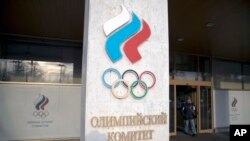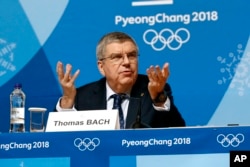The International Olympic Committee will appeal to Switzerland's supreme court against rulings that cleared some Russian athletes of doping sanctions from the Sochi Games.
The Olympic body is "not satisfied at all" by the verdicts and written explanations from the Court of Arbitration for Sport, IOC President Thomas Bach said Thursday after an executive board meeting.
The Swiss Federal Tribunal, also based in Lausanne, can overturn CAS verdicts if the legal process was abused, though appeals rarely succeed.
"The chances of winning did not play a role in our discussion," Bach said at a news conference. "The only factor which led us to this decision was the protection of the clean athletes who have finished behind the Russian athletes who have not been declared innocent."
Days before the Pyeongchang Winter Games in February, two CAS judging panels upheld appeals of 28 Russian athletes against IOC sanctions that included being subjected to Olympic life bans and being stripped of their Sochi results.
CAS said the IOC's investigations in those cases did not prove doping offenses, while also stressing the 28 were not formally declared innocent of taking part in orchestrated cheating.
The verdicts irritated Olympic leaders who believed the sports court applied the burden of proof of a criminal case. Sports law in a civil court like CAS typically requires cases to be proven to the "comfortable satisfaction" of judges.
Bach said on Thursday the IOC had "put ourselves into the shoes" of athletes who would want the Russian appeal victories evaluated again.
A further 11 Russians lost their appeals at CAS, which confirmed their Sochi disqualifications.
The Russian athletes' urgent appeals to CAS followed a slew of IOC disciplinary hearings late last year to process the cases before the Pyeongchang Games, where some hoped to compete.
The IOC disqualified 43 Russians from their Sochi Olympics results for doping offenses. Those cases sought to verify allegations and evidence presented by World Anti-Doping Agency-appointed investigator Richard McLaren and Russian whistle-blower Grigory Rodchenkov, the former director of testing laboratories in Moscow and Sochi.
In one detailed verdict published two weeks ago, the CAS judges found flaws in the evidence-gathering and conclusions of the two star witnesses. Rodchenkov testified from a secret location in the United States, where he is in a witness protection program.
A 154-page document detailed why a three-man CAS panel upheld the appeal of cross-country skier Alexander Legkov. He was reinstated as the gold medalist in the 50-kilometer freestyle race and the silver medalist in the 4x10-kilometer relay from the Sochi Games.





